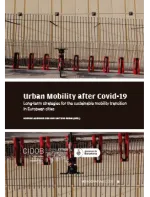Prologue: Social economy companies and the transformation of urban mobility

The “social economy” is formed of private organisations that people create in the attempt to address their own social demands, substantive problems and social aspirations (Chaves and Monzón, 2018). Social Economy Europe considers that, beyond a legal structure, social economy entities share the following characteristics: primacy of people and social goals over capital; democratic control by members (except in foundations); most surpluses reinvested to support sustainable development goals or services of interest to members or more generally; voluntary and open membership; defending and applying the principles of solidarity and responsibility; and autonomous management and independence from public authorities (Social Economy Europe, 2021). In fact, the organisations that make up the social economy have diverse legal structures, ranging from cooperatives and employee-owned companies to mutual societies, foundations and associations. The common thread is that they are all private endeavours with legal personality that are free and voluntary in nature, have democratic decision-making processes and are created by civil society to meet and resolve the needs of specific individuals or groups rather than to repay the investments of capitalist partners.